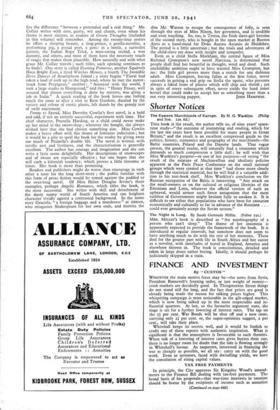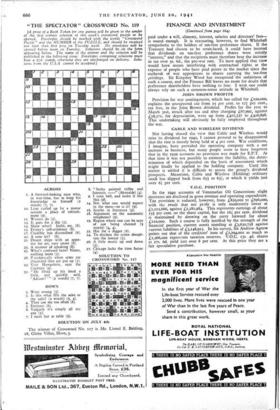FINANCE AND INVESTMENT
By " CUSTOS "
WHATEVER the main motive force may be—the news from Syria, President Roosevelt's freezing order, or just weight of money— stock markets are decidedly good. In Throgmorton Street things do not stand still for long, and the fact that prices are good is already being made the reason for talking prices higher. This whispering campaign is most noticeable in the gilt-edged market, which is now being talked up in the most respectable and in- fluential quarters. At last, so the favourite argument runs, the stage is set for a further lowering of interest rates. The tap on the 2+ per cent. War Bonds will be shut off and a new issue, carrying only 2+ per cent, or, the super-optimists suggest, 2 per cent., will take their place.
Whitehall keeps its secrets well, and it would be foolish to credit any of these reports with authentic inspiration. What is significant is that the atmosphere is favourable to such theories. When talk of a lowering of interest rates gives buyers their cue, there is no longer room for doubt that the tide is flowing strongly in Whitehall's favour. As taxpayers, interested in financing the war as cheaply as possible, we all say: carry on with the good work. Even as investors, faced with dwindling yields, we have the consolation of rising capital values.
TAX FREE PAYMENTS
In principle, the City approves Sir Kingsley Wood's amend- ments to the Finance Bill dealing with tax-free payments. The broad basis of his proposals—that war-time increases in taxation should be borne by the recipients of income such as annuities (Continued on page 666)
FINANCE AND INVESTMENT
(Continued from page 664) paid under a will, alimony, interest, salaries and directors' fees- is sound enough. It is reassuring, however, to find Whitehall sympathetic to the holders of tax-free preference shares. If the Treasury had chosen to be strait-laced, it could have insisted that dividends on tax-free preference shares were strictly "interest," and that the recipients must therefore bear the increase in tax over 5s. 6d., the pre-war rate. To have applied that view would have meant interfering with contractual rights at the expense of people who have paid prices in the market since the outbreak of war appropriate to shares carrying the tax-free privilege. Sir Kingsley Wood has recognised the unfairness of such a course, and the Finance Bill leaves no room for doubt that preference shareholders have nothing to fear. I wish one could always rely on such a common-sense attitude in Whitehall.
JOHN BROWN PROFITS
Provision for war contingencies, which has called for £roo,000, explains the unexpected cut from 15 per cent. to 124 per cent., tax free, in the John Brown dividend. Profits for the year to March 31st, struck after tax and after charging £67,992, against £58,371, for depreciation, were up from £411,337 to £426,898. This undertaking will obviously be fully employed throughout the war.
CABLE AND WIRELESS DIVIDEND
Not having shared the view that Cable and Wireless would raise its dividend for 1940, I cannot pretend to be disappointed that the rate is merely being held at 4 per cent. War conditions, I imagine, have provided the operating company with a net increase in business, but many people seem to have forgotten that in the 1939 accounts no provision was made for E.P.T. At that time it was not possible to estimate the liability, the deter- mination of which depended on the basis of assessment which might finally be applied to the holding company. Until this matter is settled it is difficult to assess the group's dividend prospects. Meantime, Cable and Wireless (Holding) ordinary stock has slipped back from 654 to 631, at which it yields just over 61 per cent.
V.O.C. POSITION
In the 1940 accounts of Venezuelan Oil Concessions slight decreases are disclosed in gross revenue and operating expenditure. Tax provision is reduced, however, from £850,000 to £696,000, with th. result that net profit is only moderately lower at £1,103,666, against £1,281,984. This represents earnings of about 154 per cent. on the share capital, but the 168 per cent. dividend is maintained by drawing on the carry forward for about Lito,000. Such a course is fully justified by the strength of the financial position, current assets standing at £3,630,758 against current liabilities of £3,148,915. In his survey, Sir Andrew Agnew points out that of the creditors' item of £2,294,000 as much as £1,366,00o represents taxation reserves. V.O.C. 13s. 4d. shares at 27s. 6d. yield just over 8 per cent. At this price they are a fair speculative purchase.



























 Previous page
Previous page